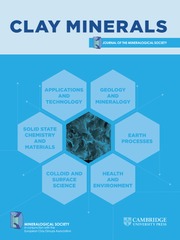Crossref Citations
This article has been cited by the following publications. This list is generated based on data provided by
Crossref.
Thomas, Joan E.
and
Kelley, Michael J.
2008.
Interaction of mineral surfaces with simple organic molecules by diffuse reflectance IR spectroscopy (DRIFT).
Journal of Colloid and Interface Science,
Vol. 322,
Issue. 2,
p.
516.
Cheng, Hongfei
Liu, Qinfu
Yang, Jing
Zhang, Qian
and
Frost, Ray L.
2010.
Thermal behavior and decomposition of kaolinite–potassium acetate intercalation composite.
Thermochimica Acta,
Vol. 503-504,
Issue. ,
p.
16.
Zhang, Yinmin
Liu, Qinfu
Wu, Zeguang
Zheng, Qiming
and
Cheng, Hongfei
2012.
Thermal behavior analysis of kaolinite–dimethylsulfoxide intercalation complex.
Journal of Thermal Analysis and Calorimetry,
Vol. 110,
Issue. 3,
p.
1167.
Cheng, Hongfei
Liu, Qinfu
Yang, Jing
Ma, Songjiang
and
Frost, Ray L.
2012.
The thermal behavior of kaolinite intercalation complexes-A review.
Thermochimica Acta,
Vol. 545,
Issue. ,
p.
1.
Zeng, Lu
Cao, Dan-yang
Xu, Yan
Fan, Chun-wei
and
Peng, Xiao-qin
2014.
Novel method for preparation of calcined kaolin intercalation compound-based geopolymer.
Applied Clay Science,
Vol. 101,
Issue. ,
p.
637.
El-Shafey, Ola I.
Fathy, Nady A.
and
El-Nabarawy, Thoria A.
2014.
Sorption of Ammonium Ions onto Natural and Modified Egyptian Kaolinites: Kinetic and Equilibrium Studies.
Advances in Physical Chemistry,
Vol. 2014,
Issue. ,
p.
1.
Baccour, Amina
Sahnoun, Rym Dhouib
and
Bouaziz, Jamel
2014.
Effects of mechanochemical treatment on the properties of kaolin and phosphate–kaolin materials.
Powder Technology,
Vol. 264,
Issue. ,
p.
477.
Alwaan, I. M.
2014.
A Study on the Adhesion of Styrene-Butadiene Rubber with Red Kaolinite on Aluminum Surface.
ISRN Chemical Engineering,
Vol. 2014,
Issue. ,
p.
1.
Kovářík, T.
Bělský, P.
Novotný, P.
Říha, J.
Savková, J.
Medlín, R.
Rieger, D.
and
Holba, P.
2015.
Structural and physical changes of re-calcined metakaolin regarding its reactivity.
Construction and Building Materials,
Vol. 80,
Issue. ,
p.
98.
Shao, Godlisten N.
Engole, Marion
Imran, S.M.
Jeon, Sun Jeong
and
Kim, Hee Taik
2015.
Sol–gel synthesis of photoactive kaolinite-titania: Effect of the preparation method and their photocatalytic properties.
Applied Surface Science,
Vol. 331,
Issue. ,
p.
98.
Li, Lixin
Zhang, Yinmin
Zhang, Yongfeng
Sun, Junmin
and
Hao, Zhifei
2016.
The thermal activation process of coal gangue selected from Zhungeer in China.
Journal of Thermal Analysis and Calorimetry,
Vol. 126,
Issue. 3,
p.
1559.
Naamen, S.
Jâafar, N.
Ben Rhaiem, H.
Ben Haj Amara, A.
Plançon, A.
and
Muller, F.
2016.
XRD investigation of the intercalation of nacrite with cesium chloride.
Clay Minerals,
Vol. 51,
Issue. 1,
p.
29.
Cao, Zhao
Cao, Yongdan
Dong, Hongjuan
Zhang, Jinshan
and
Sun, Chunbao
2016.
Effect of calcination condition on the microstructure and pozzolanic activity of calcined coal gangue.
International Journal of Mineral Processing,
Vol. 146,
Issue. ,
p.
23.
Belmokhtar, Noureddine
Ammari, Mohammed
Brigui, Jamal
and
Ben allal, Laïla
2017.
Comparison of the microstructure and the compressive strength of two geopolymers derived from Metakaolin and an industrial sludge.
Construction and Building Materials,
Vol. 146,
Issue. ,
p.
621.
Sedmale, Gaida
Randers, Martins
Rundans, Maris
and
Seglins, Valdis
2017.
Application of differently treated illite and illite clay samples for the development of ceramics.
Applied Clay Science,
Vol. 146,
Issue. ,
p.
397.
Meite, Namory
Konan, Léon Koffi
Bamba, Drissa
Goure-Doubi, Bi Irié Hervé
and
Oyetola, Samuel
2018.
Structural and Thermomechanical Study of Plastic Films Made from Cassava-Starch Reinforced with Kaolin and Metakaolin.
Materials Sciences and Applications,
Vol. 09,
Issue. 01,
p.
41.
Wang, Yunpeng
Zhang, Yongfeng
Zhou, Quan
Zhang, Yinmin
and
Sun, Junmin
2018.
Thermal kinetics analysis of coal-gangue selected from Inner Mongolia in China.
Journal of Thermal Analysis and Calorimetry,
Vol. 131,
Issue. 2,
p.
1835.
BİLGİÇ, Ceyda
and
BİLGİÇ, Şafak
2019.
Fourier Dönüşümlü Kızılötesi (FTIR) Spektroskopisinin Killerin Analizlerinde Kullanılması.
Nevşehir Bilim ve Teknoloji Dergisi,
Vol. 8,
Issue. ,
p.
37.
Kloprogge, Jacob
2019.
Spectroscopic Methods in the Study of Kaolin Minerals and Their Modifications.
p.
41.
Lopes, Joaldo da Silva
Rodrigues, Wallonilson Veras
Oliveira, Vaeudo Valdimiro
Braga, Aluska do Nascimento Simões
da Silva, Regiane Teixeira
França, Aline Aparecida Carvalho
da Paz, Edson Carvalho
Osajima, Josy Anteveli
and
da Silva Filho, Edson Cavalcanti
2019.
Modification of kaolinite from Pará/Brazil region applied in the anionic dye photocatalytic discoloration.
Applied Clay Science,
Vol. 168,
Issue. ,
p.
295.

